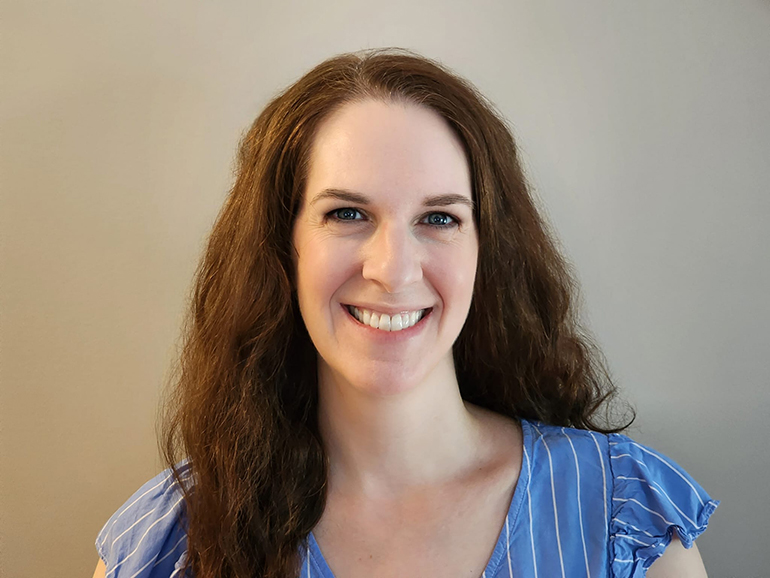
DETROIT – Some people deal with change better than others, especially in challenging times. But why do some individuals seem to adjust where others may become anxious and struggle to adapt to new situations?
It’s one of many queries Kristie Van de Laar, Ph.D., hopes to tackle in her new role as associate director of training at Wayne State University’s Counseling and Psychological Services (CAPS).
A licensed psychologist who has worked at CAPS since 2009, Van de Laar will oversee a large clinical training program that includes social work, counseling and psychology interns, as well as psychiatry residents and psychology practicum students. These trainees – under the supervision of CAPS staff – provide clinical services to hundreds of Wayne State students each year.
“I want to provide the best possible training for the trainees as they start and orient themselves to CAPS, and make sure that they feel heard and listened to and validated,” Van de Laar said.
Located on the fifth floor of the Student Center Building, CAPS’s dynamic staff of licensed professional counselors, psychologists and social workers provides free and confidential mental health assessment, counseling, case management and referrals to all currently registered Wayne State students. CAPS plays a vital role in supporting the mental health and well-being of students, contributing to a positive and healthy college experience.
“I’ve always enjoyed the teaching side of psychology and fell in love with counseling students,” Van de Laar said. “But I've always wanted to be a part of training the next generation of therapists.”
In addition to WSU graduate programs, CAPS trainees come from regional schools, like the Michigan School of Psychology in Farmington Hills, the University of Michigan, Oakland University and University of Detroit-Mercy. Past trainees have come from as far as Long Island University, LaSalle University and the University of Toronto.
“Once they start, it’s my job to orient them to what it is like to work at CAPS,” said Van de Laar, who also serves as a CAPS professional development coordinator and liaison to the Wayne State Law School. “They will get some hands-on training while working with clients under the supervision of licensed professionals. But they will help us meet the students' needs as I oversee the supervisors who will provide the one-on-one supervision.”
As student mental health needs surge in the United States, Van de Laar is wary of compassion fatigue for her incoming class of CAPS trainees.
“This is very much a field where they'll be working with clients who might trigger them,” Van de Laar said. “So, I think helping them recognize boundaries and self-care is important because they’re going to see clients all day who are going to be telling some very difficult stories.
“When you go home at five o'clock, how do you shut it off? Our more senior staff has boundaries. We've learned how to kind of do our own self-care and separate home life from our work life. But I think trainees sometimes go home and their minds are spinning like, ‘Oh, what can I do?’ So, we want to be able to help them recognize how they can help clients, but also self-care for themselves. That boundary tends to be the main thing we need to look at when the trainees first start.”
Van de Laar, who received her Ph.D. from Southern Illinois University and an undergraduate degree in psychology from the University of Michigan, said college students today are much more open to seeking help.
“If you asked me 14 years ago, I would've said there was a stigma to counseling,” she said. “But as of now, whether it’s TikTok or just talking with peers, I feel like the stigma has gone away. I rarely hear that at this point. Sure, there are some families that might have some cultural reasons for not doing therapy. But for the most part, students are much more open, self-disclosing, and vulnerable, and, I think it’s great.”
If students are hesitant to schedule in-person time with a counselor, Van de Laar suggests Let’s Talk, a drop-in program that provides 15- to 20-minute consultations with a CAPS counselor through a virtual meeting.
“Sometimes, people have in their mind this perception that they’re on the couch having to divulge their entire life,” she said. “That's not typically how we would do things at CAPS. I would say drop into Let's Talk, which is anonymous. Just talk a little bit about their concerns and then the counselor can elaborate more upon what services CAPS offers, what counseling looks like, or if there's an issue that's they're dealing with that day, just give some really brief problem-solving coping tips.”
WSU students interested in counseling can start by requesting an initial consultation to see which CAPS service best meets their needs. The link is active weekdays from 8:30 a.m. to 3:30 p.m.
